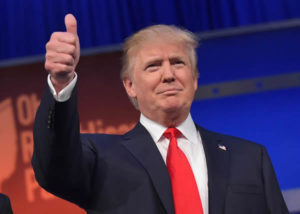
The U.S. oil and gas industry on Wednesday welcomed President-elect Donald Trump’s choice of former Texas Governor Rick Perry to head the U.S. Department of Energy, and wasted no time making its first specific request of him: to support increased exports of America’s natural gas overseas.
Trump named Perry as his pick for the top U.S. energy job on Wednesday morning, handing the portfolio to a climate change skeptic with close ties to the oil and gas industry, and who previously proposed abolishing the department.
The choice adds to a list of drilling proponents who have been tapped for top jobs in Trump’s administration, worrying environmental groups but fitting neatly with Trump’s promise to revive oil and gas drilling and coal mining as president by cutting back on federal regulation.
Jack Gerard, president of the Washington-based American Petroleum Institute representing oil and natural gas companies, said he welcomed Perry’s nomination, and called on him to make increasing exports of U.S. natural gas a “top priority.”
“As the former governor of Texas, Rick Perry knows the important impact that energy production has on our nation’s economy. In his new role at the Energy Department, he has the opportunity to encourage increased exports of domestically produced natural gas,” he said in a statement.
Natural gas companies are eager to access foreign markets for their supply after a decade-long drilling boom that triggered a domestic glut and depressed prices.
The oil industry successfully lobbied for an end to a decades-old crude oil export ban in December 2015 following a slump in prices, a move meant to help American companies weather lower prices at home.
There is no ban on natural gas exports, but U.S. law requires American companies to obtain authorization from the Energy Department before being able to ship it overseas, and there are tough permitting requirements for building the specialized facilities that make shipping gas possible.
The United States exported its first cargo of liquefied natural gas earlier this year from an export facility on the Gulf Coast, but the industry has complained that boosting exports to match global demand has been constrained by a slow and opaque bureaucratic process.
U.S. energy exports have long been a contentious political issue, dividing lawmakers seeking to balance the benefits of low consumer prices at home and American energy independence against opportunities for companies to expand access to potentially lucrative foreign markets.
Trump, who takes office on Jan. 20, has made energy a central part of his agenda, vowing a revival in the oil, gas and coal industries, and picking industry allies for top administration jobs.
On Tuesday, Trump selected oil giant Exxon Mobil Corp’s CEO Rex Tillerson as secretary of state. His Environmental Protection Agency pick is Oklahoma Attorney General Scott Pruitt, a foe of Democratic President Barack Obama’s initiatives to combat climate change.
Trump said during his campaign he would pull the United States out of a global deal to curb emissions of carbon dioxide signed in Paris last year, though he has since confused observers by saying he would keep an “open mind” on the accord.
An overwhelming number of scientists say carbon dioxide from burning fossil fuels contributes to changes to the climate that are leading to sea level rise, droughts and more frequent violent storms.
Trump’s transition team said Perry’s tenure leading Texas, the nation’s second most populous state and a major producer of oil, gas and wind power, from 2000 until 2015 made him a strong pick for energy secretary.
Trump said in a statement Perry had created “a business climate that produced millions of new jobs and lower energy prices in his state, and he will bring that same approach to our entire country as secretary of energy.”
The department is responsible for U.S. energy policy and oversees the nation’s nuclear weapons program.
Perry is a former presidential rival and critic of Trump who unsuccessfully sought the Republican nomination in 2016 and 2012. His nomination requires Senate confirmation.
If confirmed, he would replace Ernest Moniz, a physicist who was one of the chief negotiators in last year’s Iran nuclear deal.
After his tenure as Texas governor, Perry joined the board of directors of Energy Transfer Partners, a Texas-based company building the Dakota Access Pipeline in North Dakota that has been stalled by protests by the Standing Rock Sioux tribe and supporters.
Anthony Scaramucci, a member of the Trump transition team’s executive committee, said the president-elect was focused on preserving the environment as well as boosting U.S. energy production.
“Whether you believe in climate change or not, we want clean air, we want clean water for the American people. What we also want is energy independence,” Scaramucci told CNN.
Billionaire environmental activist Tom Steyer, who backed Trump’s Democratic opponent Hillary Clinton in the Nov. 8 election, said he hoped Perry’s nomination would be blocked.
“Trump no longer has to abolish departments. He can dismantle them from within,” Steyer said. “It’s now up to the Senate to defend our health, our economy and our democracy by defeating this nomination.” Source: Reuters.
Copyright Ships & Ports Ltd. Permission to use quotations from this article is granted subject to appropriate credit given to www.shipsandports.com.ng as the source.
